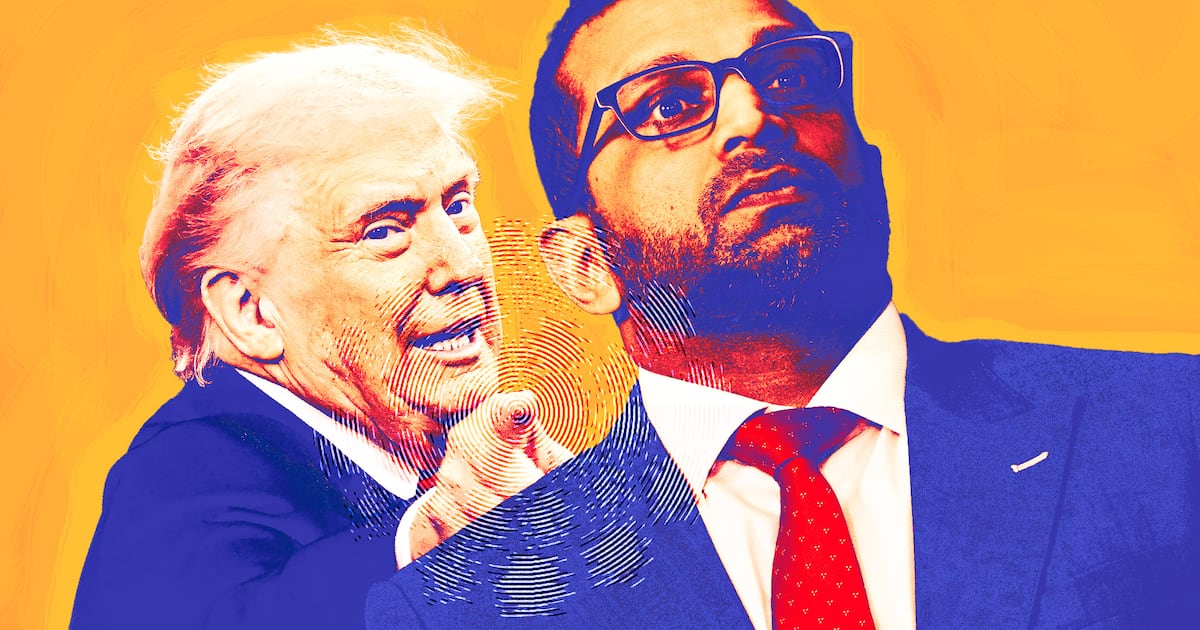This week, Aleksei Burkov, a convicted Russian cybercriminal, waltzed into John F. Kennedy International Airport in New York, boarded a commercial flight, and flew back home to Moscow unimpeded.
But he wasn’t on the lam from U.S. law enforcement. U.S. immigration officials told The Daily Beast that the government chose to send him back to Russia and officers from Immigration and Customs Enforcement (ICE) escorted him onto his flight.
That’s despite the fact that just one year ago, Burkov, who ran cybercrime forums used by the crème de la crème of Russian hackers and a forum that sold stolen payment card data, was sentenced to nine years in prison in the U.S.
Former U.S. officials have said the government’s decision to let Burkov go free this week has left them somewhat befuddled. The U.S. does not have an extradition treaty with Russia, making this kind of release incredibly rare, and Burkov’s arrest and extradition were particularly hard-fought. He was originally arrested in Israel at the request of U.S. authorities in 2015, then later extradited to the U.S. to face charges related to facilitating more than $20 million in credit card fraud. Over the course of the years-long international sentencing effort, U.S. law enforcement officials resisted Moscow’s efforts to bring him home, making the decision to hand him over to Russia—which has typically been sympathetic towards Russian cybercriminals hacking U.S. entities and Americans—even more surprising.
The U.S. government doesn’t have a consistent line on who was responsible for letting Burkov go. The White House and Departments of Justice and State told The Daily Beast to talk to ICE. The FBI, however, referred The Daily Beast to the Secret Service, which investigates financial cybercrime and was key to Burkov’s indictment. But the Secret Service referred The Daily Beast to ICE.
Nonetheless, Burkov was transferred from the Federal Bureau of Prisons to ICE custody on Aug. 25, according to government records, which don’t indicate the reason behind the transfer. From there, ICE released Burkov to Moscow.
“Burkov is wanted by Russian authorities,” Dani Bennett, an ICE spokesperson, said of the decision to send him to Russia. Bennett added there is an INTERPOL Red Notice out for him and that there has been an arrest warrant out for Burkov since 2017 in Russia.
It’s not entirely clear why the U.S. would reverse course on its past efforts to bring Russian criminals to justice in U.S. courtrooms and feed one directly back to Moscow, where the Kremlin have historically turned cybercriminals into assets for Moscow’s own intelligence work. But the apparent shift in this case has raised questions about whether Moscow and Washington are attempting to jointly hold criminal hackers accountable, preparing a prisoner swap, or just working to ease long-held tensions that permeate U.S.-Russia relations.
Burkov’s release comes months into a Biden administration effort to get Moscow to pay more attention to and punish cybercriminals operating out of Russia who have been hacking U.S. entities. But most of these efforts have so far not yielded results, according to U.S. officials.
Russian officials have long said that they take cybercrime seriously, although hackers have been allowed to operate from Russia for years, at times moonlighting for Russian intelligence services. Meanwhile, Russian authorities have typically lent them latitude to hack with abandon.
Sending a cybercriminal to Russia could be a test of the Kremlin’s willingness to step up and actually tamp down on cybercrime, says Fiona Hill, who served as senior director for European and Russian affairs at the White House National Security Council between 2017 and 2019.
“This could be a test of their willingness to cooperate with us. We obviously don’t know yet,” Hill, who previously served as national intelligence officer for Russia and Eurasia at the National Intelligence Council, told The Daily Beast. “We have had conversations about these kinds of issues for a considerable period of time stretching back over a couple of administrations.”
When Burkov landed in Russia, Russian police reportedly detained him at the airport, according to TASS. Whether there is any explicit agreement between Russian and U.S. authorities to cooperate on holding Burkov accountable is a mystery—U.S. officials declined to comment on the record about such work.
The proof, of course, of any intentions to hold Burkov accountable, will come in the coming days. U.S. officials would do well to monitor the authorities’ behavior towards Burkov to see if “the Russians don’t release him out… to see whether they actually treat him as a criminal or a hero will be key,” Hill told The Daily Beast.
With history as any guide, Russia may not follow through. Efforts to track down notorious Russian cybercriminals typically get stymied by the Russians, who, instead of helping, co-opt the criminal targets to work on behalf of Russian intelligence instead.
“Is there the potential that this is going to herald in a new era in cooperation? If so that’s a huge victory but there’s reason to be quite skeptical on that,” Jamil Jaffer, a former attorney at the Department of Justice’s national security division, told The Daily Beast.
Burkov’s case alone likely wouldn’t be enough to determine that U.S. and Russian cooperation on tackling cybercrime has shifted dramatically, says Hill, now the Robert Bosch senior fellow in the Center on the United States and Europe in the Foreign Policy program at Brookings.
”Is it just one symbolic example everyone will point to? … The Russians and others have a saying, ‘One swallow doesn’t make a spring,’ … this one case is not going to be sufficient to say anything has changed. It’s a start but let’s see. If nothing further happens then it becomes a meaningless blip in the larger context of [cybercrime cooperation],” Hill said. “If ransomware or cybercrimes are being given a nod by the Russian intelligence services, then we’re going to have a hard time making significant progress.”
Burkov’s release could also be a more general kind of détente or peace offering from the U.S. government after years of escalating tensions between the U.S. and Russia. Leaning on international law enforcement cooperation is an old trick in the playbook on easing tensions between two countries, a former European law enforcement official not authorized to speak with the press by their current employer told The Daily Beast. If there’s some sort of agreement between Washington and Moscow behind the scenes that the U.S. release Burkov to Russia, and Russian authorities demonstrate they take cybercrime seriously in his case, an element of goodwill between U.S. and Russian officials could feed into other diplomatic conversations.
“Some of the relationships between Russia and the U.S. have been really difficult and law enforcement and diplomacy can help to ease tension. Sharing evidence and getting bad guys tried is a nice way of easing tension and starting to build a tiny bit of trust,” the former official, who has engaged in this kind of work before, said.
Already, Dmitry Peskov, a spokesperson for the Kremlin, has said Burkov’s release is a positive development for U.S.-Russia relations, according to The Wall Street Journal. He did not elaborate.
Questions have also been swirling over whether Burkov’s release could be part of a prisoner swap. Russian President Vladimir Putin has raised the prospect of exchanging Americans imprisoned in Russia for Russians jailed in the U.S. in recent months. “We hope very much we can establish this process with our American partners,” Putin said in an interview with NBC News this June.
And although the U.S. has worked with the Kremlin on spy swaps in the past—such as in 2010 when the U.S. returned 10 Russian prisoners that were operating as “sleeper” agents in the U.S. in exchange for the release of alleged double agents—Burkov’s release this week is not necessarily part of some kind of exchange, U.S. officials and sources familiar with the case told The Daily Beast.
There are no indications so far that ex-Marine Paul Whelan, who has been imprisoned in Russia since 2018 and is accused of working as a U.S. spy, is up for any kind of exchange, his family told The Daily Beast. “He remains at IK-17 and we are unaware of any plans or discussion for his release and return home,” Whelan’s brother, David, told The Daily Beast this week, referring to the prison, IK-17.
”I would just advise caution. It might open a door for American detainees, if we generally have a more cooperative environment, and this may well signal the beginning of more law enforcement [cooperation]” Hill said. “But… I wouldn’t jump too quickly.”
Burkov’s release could alternatively indicate that he cooperated with U.S. law enforcement by naming names or sharing information of interest in other cases, says Jaffer.
“One theory might be that he provided material cooperation on Russian hacking or the like—[but] that seems a less likely scenario because if that were the case it’s unlikely he’d want to be returned to Russia,” said Jaffer, founder and executive director of the National Security Institute.
The U.S. has already rolled up a series of cybercriminals thought to be a part of Burkov’s criminal network—Ruslan Yeliseyev, who operated on Burkov’s forum, was arrested in Israel in 2016, extradited to the U.S., and sentenced to prison, just like Burkov, according to court filings. Other hackers have been targeted by U.S. law enforcement for their knowledge about stolen information exchanged on Burkov’s forums in recent years as well.
But just because some of Burkov’s network has been broken up, doesn’t mean there aren’t bigger fish to fry.
“In any mafia case your goal isn’t to get that [low-level] dude, the guy driving the car—you wanna get the boss,” Jaffer said. “You’re always bringing charges of any kind against these low-level guys and working your way up.”








